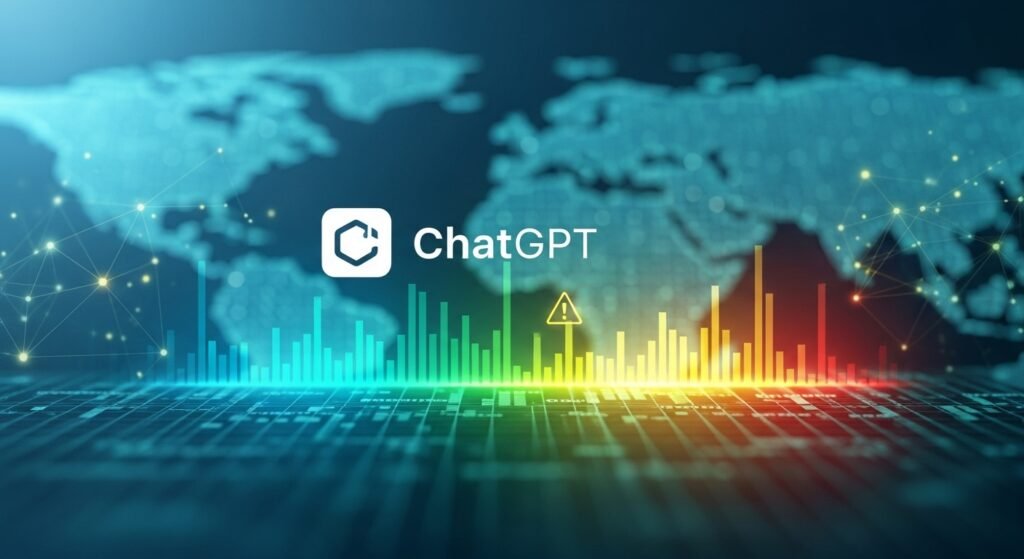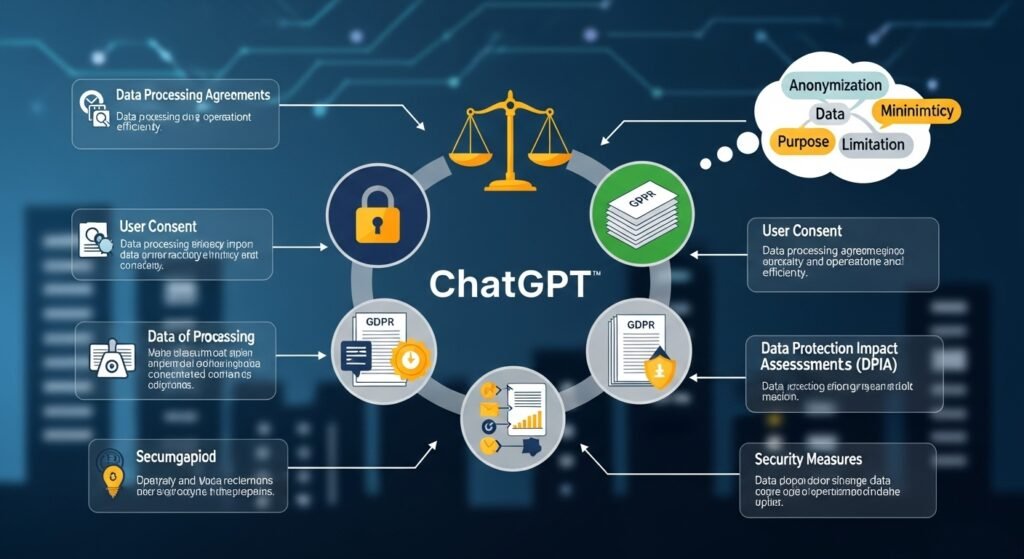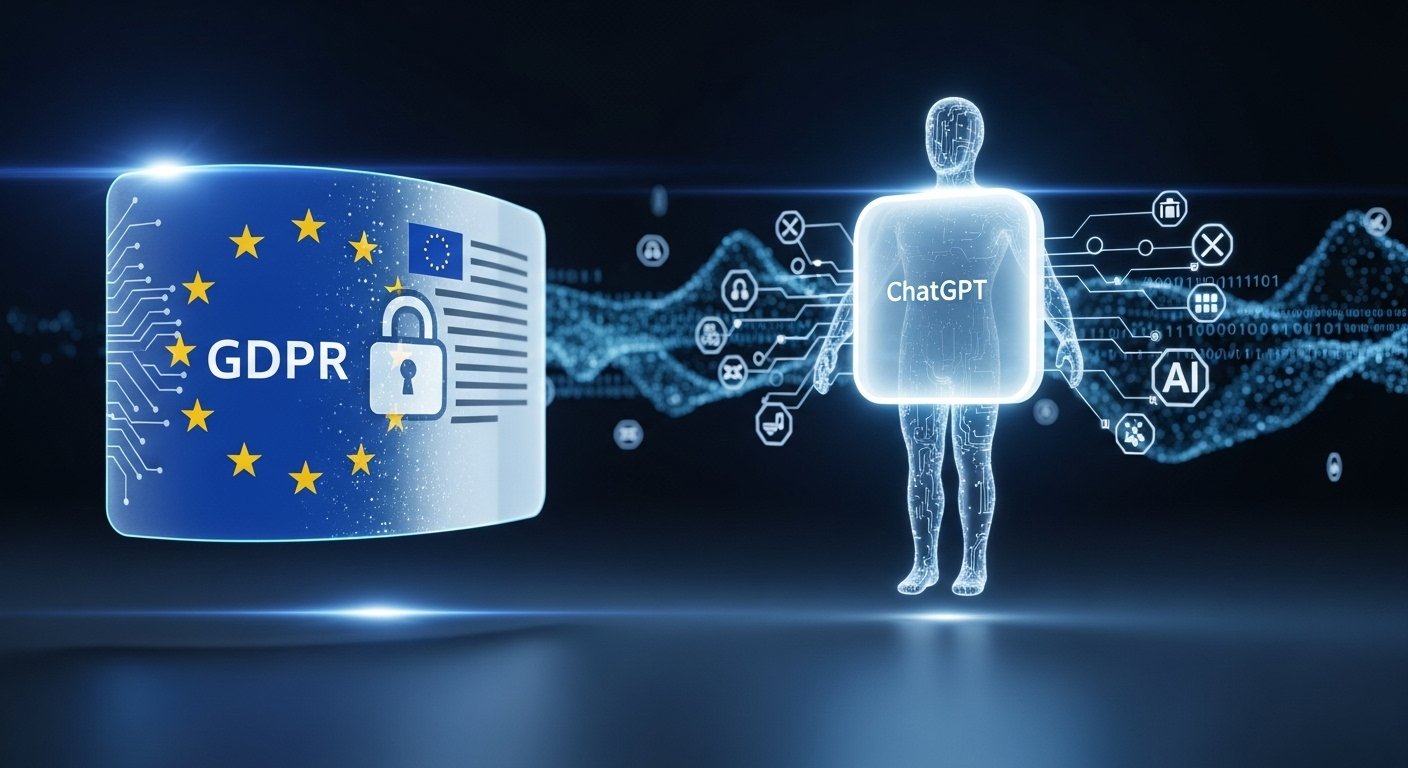ChatGPT, developed by OpenAI, is a revolutionary AI tool that generates human-like text based on user inputs. Its capabilities have made it popular across industries, but its use raises significant questions about data protection, particularly in regions governed by the General Data Protection Regulation (GDPR). GDPR is a comprehensive data protection law in the European Union (EU) and the United Kingdom (UK) that sets strict rules for handling personal data.
Understanding GDPR
GDPR, enacted in 2018, protects the privacy and personal data of individuals in the EU and UK. It applies to any organization processing personal data of individuals in these regions, regardless of where the organization is based. Key GDPR principles include:
- Lawfulness, fairness, and transparency: Data must be processed legally and with clear communication.
- Purpose limitation: Data should be collected for specific, legitimate purposes.
- Data minimization: Only necessary data should be collected.
- Accuracy: Data must be accurate and up-to-date.
- Storage limitation: Data should not be kept longer than needed.
- Integrity and confidentiality: Data must be processed securely.
- Accountability: Organizations must demonstrate compliance.
These principles are critical when assessing ChatGPT’s compliance. For more details, see the official GDPR text.
How ChatGPT Processes Data
ChatGPT processes vast amounts of text data to generate responses. When users interact with ChatGPT, their inputs (prompts) and the AI’s outputs are stored and may be used to improve the model. This can include personal data, such as names, emails, or other identifiable information, raising GDPR concerns.
Key Data Processing Aspects
- Training Purposes: By default, user interactions may be used to train ChatGPT. Users can opt out in some versions, but data is still stored for up to 30 days.
- Storage: Data is retained, even if not used for training, posing risks for GDPR compliance.
- No Deletion: OpenAI has stated it cannot delete specific prompts or data due to the model’s training process, conflicting with GDPR’s “right to be forgotten.”
Compliance Challenges for ChatGPT

ChatGPT faces several challenges in meeting GDPR requirements:
Right to Access and Erasure
Under GDPR, individuals have the right to access their personal data and request its deletion (Article 17). However, OpenAI has admitted it cannot delete specific data from ChatGPT because it is integrated into the model’s training. This makes it difficult to comply with GDPR’s erasure rights, as noted in a Fieldfisher article.
Data Minimization and Purpose Limitation
ChatGPT collects all inputs and outputs, which may include unnecessary personal data. This could violate GDPR’s principles of data minimization (collecting only what is needed) and purpose limitation (using data only for specified purposes).
Consent and Transparency
GDPR requires clear, informed, and freely given consent for data processing. While users consent to data processing by using ChatGPT’s terms of service, the complexity of AI systems may make it hard for users to fully understand what they’re agreeing to, as discussed in Simpliant Insights.
Data Security
GDPR mandates robust security measures to protect personal data. While OpenAI claims to have security measures like encryption, the risk of breaches or unauthorized access remains a concern, especially for sensitive data.
Different Versions of ChatGPT and Their Compliance
ChatGPT offers different versions, each with varying compliance implications:
Free Versions (ChatGPT 3.5 and 4)
- No Data Processing Agreement (DPA): OpenAI does not provide a DPA for free versions, making personal data processing unlawful under GDPR (Article 28).
- Data Used for Training: By default, data is used for training, though users can deactivate this under settings. Data is still stored for 30 days, as noted in activeMind.legal.
- Security: No specific security measures are detailed. Users are advised to avoid processing personal data or use pseudonymization.
- Recommendation: Only use free versions if no personal data is involved.
API and Enterprise Edition
- DPA Available: OpenAI provides a DPA for API and Enterprise users, committing to GDPR obligations like assisting with data subject rights (OpenAI Enterprise Privacy).
- No Training Use: With proper configurations, interactions are not used for training.
- Enhanced Security: Includes data encryption and SOC 2 certification, though ISO 27001 is more common in Europe.
- Compliance Possibility: These versions can be used with personal data if a Data Protection Officer (DPO) verifies compliance with the DPA and technical measures.
- Third-Country Transfers: Data transfers to the US are governed by Standard Contractual Clauses (SCCs), but additional safeguards may be needed.
| Aspect | Free Versions (3.5 and 4) | API and Enterprise Edition |
|---|---|---|
| DPA | No DPA provided; unlawful for personal data | DPA provided; meets Art. 28 GDPR |
| Training | Data used for training (opt-out available) | No training use with proper settings |
| Security | No specific measures; pseudonymization advised | Encryption, SOC 2 certification |
| Compliance | Not suitable for personal data | Possible with DPO verification |
Business Use of ChatGPT and GDPR

For businesses, using ChatGPT with personal data requires careful consideration of GDPR compliance:
Applicability
GDPR applies to businesses using the ChatGPT API, even if they are not directly collecting data, as per the CJEU ruling C-40/17 Fashion ID. Non-EU/UK businesses targeting these markets must also comply, as highlighted in Legalnodes.
Key Compliance Requirements
- Lawful Basis for Processing: Identify a lawful basis (e.g., consent, contract, legal obligation), as emphasized by the UK’s Information Commissioner’s Office (ICO) (HarperJames).
- Valid Consent: Ensure consent is freely given, specific, and withdrawable.
- User Information: Update privacy policies and include disclaimers about ChatGPT use.
- Data Subject Rights: Be prepared to handle requests for access, rectification, erasure, etc., though erasure is challenging.
- Protecting Minors: Use age verification to prevent access by individuals under 16 (or 13 in some cases) and obtain parental consent.
- Data Transfers: Ensure compliance with GDPR for data transfers to OpenAI (US), using SCCs or other mechanisms.
- Data Protection Impact Assessment (DPIA): Conduct a DPIA for high-risk processing to identify and mitigate risks.
Regulatory Landscape
- Italy’s Ban: In 2023, Italy temporarily banned ChatGPT due to GDPR concerns, lifted after OpenAI’s changes (TechCrunch).
- Ongoing Investigations: Spain, France, and Germany are investigating ChatGPT’s risks.
- EDPB Task Force: The European Data Protection Board (EDPB) has a task force for coordinated enforcement (activeMind.legal).
Additional Compliance Considerations
Beyond the basics, businesses must address these aspects:
Lawful Basis and Roles
- Determine the lawful basis for processing and clarify whether you are a controller, joint controller, or processor.
DPIA
- Conduct a DPIA before using ChatGPT, especially for high-risk processing, as recommended by the ICO.
Transparency and Security
- Be transparent about how personal data is used by ChatGPT.
- Implement strong security measures to protect data.
Data Minimization and Accuracy
- Minimize personal data processed and ensure accuracy.
Individual Rights
- Be ready to handle data subject rights requests, such as access or erasure.
Automated Decision-Making
- If ChatGPT is used for decisions affecting individuals, comply with GDPR’s automated decision-making rules (Article 22), ensuring human intervention options.
Record-Keeping
- Maintain records of data processing activities related to ChatGPT.
Alternatives to ChatGPT
If GDPR compliance is a concern, consider AI tools designed with data protection in mind. These tools often offer better transparency, data control, and compliance with GDPR principles. Examples include custom AI solutions or platforms with explicit GDPR-compliant features, as discussed in Alumio.
Conclusion
ChatGPT’s GDPR compliance is complex and depends on the version used and the context of use. Free versions are not suitable for processing personal data due to the lack of a DPA and other issues. API and Enterprise editions offer better compliance options but require careful management, especially for data transfers and subject rights. Businesses must assess their use cases, conduct DPIAs, and implement robust measures to protect personal data. Individuals should avoid sharing sensitive data with ChatGPT. Staying informed about regulatory developments and seeking legal advice are essential for navigating this landscape.
FAQs
Q: Can I use ChatGPT for personal use without worrying about GDPR?
A: For purely personal use, GDPR may not apply (Article 2(2)(c)), but caution is advised if you input personal data of others.
Q: Is there a way to delete my data from ChatGPT?
A: OpenAI has stated it cannot delete specific data due to model training, so once inputted, data may be permanently stored.
Q: What should businesses do to use ChatGPT compliantly?
A: Avoid processing personal data where possible, use the API with a DPA, conduct DPIAs, and ensure all GDPR requirements are met.
Q: Are there GDPR-compliant alternatives to ChatGPT?
A: Yes, some AI tools are designed with GDPR compliance in mind, offering better data control and transparency.
Q: What are the potential consequences of non-compliance?
A: Non-compliance can lead to significant fines (up to €20 million or 4% of annual global turnover), reputational damage, and legal actions.
